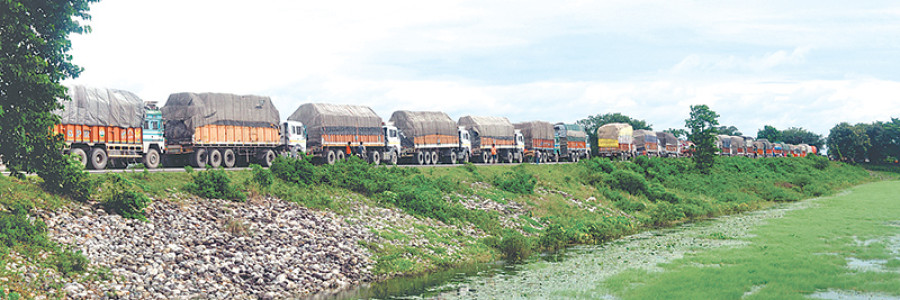Money
Delhi ‘ready’ to help reduce Nepal-India trade imbalances
India has expressed its readiness to help Nepal fill the widening trade imbalances between the two countries by revising the bilateral trade treaty in the next three months.
India has expressed its readiness to help Nepal fill the widening trade imbalances between the two countries by revising the bilateral trade treaty in the next three months.
According to the Trade and Export Promotion Centre, Nepal’s import bill amounted to Rs874.87 billion, up 20.4 percent, at the end of the third quarter in this fiscal year. However, export earnings inched up 7.4 percent to Rs59.61 billion. As a result, the country’s trade deficit swelled 21.5 percent to Rs815.26 billion.
The southern neighbour has also assured Nepal of creating an environment for hassle-free entry of Nepal’s key agricultural products such as tea, ginger, jute and large cardamom to the Indian market.
Nepal’s trade deficit with India—its single largest trading partner—has been increasing at an alarming rate over the past decade.
The commitment was made during the Indian Prime Minister Narendra Modi’s two-day visit to Nepal on May 11-12. Briefing the Lower House of Parliament on Sunday, Prime Minister KP Sharma Oli said his Indian counterpart has accorded top priority to the matter.
The trade treaty signed between the two countries states that Nepali agricultural products can be exported to India at zero or nominal customs duty. Nepali exporters have been producing phytosanitary certification issued by domestic laboratories, but Nepali products have not been put on the “positive list” by Indian customs, according to traders.
Nepal had facing non-tariff barriers from the Indian authority, particularly for allowing free transit access for agricultural goods and medicinal products in the Indian market. Last year, Nepali ginger had faced hassles several times. In many cases, the Indian authority had stopped Nepal’s exports to India citing substandard products.
Recently, 11 trucks carrying more than 17 tonnes of Nepali tea were stranded at the Nepal-India border point in Kakadbhitta, the eastern part of Nepal. The traders said the Indian authorities had imposed the restrictions claiming that the goods need to be tested by Central Food Laboratory in Kolkata, India.
Likewise, exporters of jute products, herbals and large cardamom are also facing similar hurdles.
Vice President Nanda Bahadur Pun take up the matter with Indian PM Modi during their meeting where he also requested India to take necessary initiatives to allow free movement of these products.
High-level officials at the Commerce Ministry, however, remain skeptical over the Indian side implementing the commitment. “The Indian side had come up with similar assurances on a number of occasions in the past, but it has not been materialised. As a result, exporters continue to suffer,” said an official requesting anonymity.
The two countries have also agreed to conduct a ministerial-level meeting soon to identify the possible areas of coordination to resolve the issues related to trade in agricultural products.
India has been seeking a removal of 5 percent agricultural service charge that Nepal has been imposing on the Indian agro products.
Similarly, India has also agreed to carry out energy trading as per the bilateral power trade agreement.
Nepal has been requesting India to allow Nepali gas bullets to transport cooking gas from the Indian Oil Corporation depots.
Use of additional sea ports in India; construction of integrated check points in Biratnagar, Bhairahawa and Nepalgunj; establishment of energy bank; timely construction of expressways and Butwal-Gorakhpur transmission line are among the pending issues between the two neighbouring countries.




 9.7°C Kathmandu
9.7°C Kathmandu














